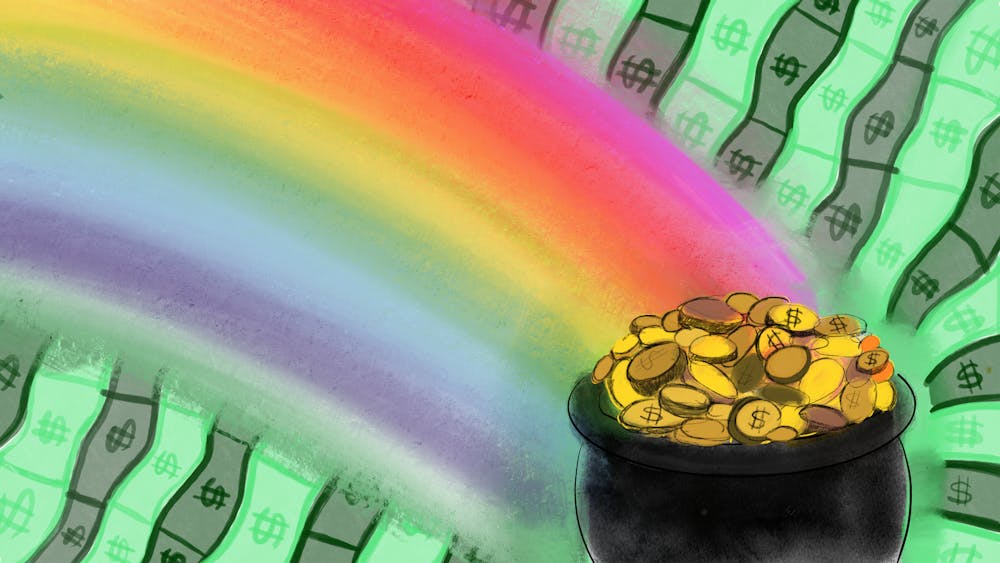At first glance, the representation of LGBTQ identities in corporate America seems nothing short of supportive and refreshing. The clothing racks at Target lined with kitschy rainbow T–shirts, rainbow home decor, and limited edition cosmetic products boast the reason for the Pride season.
Rainbow capitalism refers to the sudden appearance of corporate allyship through the switch from black and white to colorful rainbow products on the first day of June's Pride Month. However, there is immense irony in capitalistic approaches to LGBTQ representation. Industries that contribute to depriving LGBTQ people of equal rights and protection are the same that splash rainbows on their logos during June.
Pride is a time to celebrate the LGBTQ community and commemorate their decades of struggle and resistance in the United States. Specifically, Pride Month memorializes the 1969 Stonewall Riots where LGBTQ people rioted following a police raid of The Stonewall Inn, a gay bar located in New York City. The event triggered a series of pivotal social movements in the LGBTQ community, spearheaded by queer and transgender people of color (QTPOC).
The LGBTQ community experiences disproportionate crime towards transgender women of color, homophobia in the workplace, and compromised support from American legal and political systems. While rainbow capitalism strikes the average consumer as a tribute to Pride and internet “wokeness,” in most cases, it is just an empty allyship.
The LGBTQ community has always struggled with acceptance and inclusion in corporate spaces. It wasn’t until 1981 that The Village Voice, a New York City alternative publication, was the first company to offer domestic partner benefits to LGBTQ employees. Representation of same–sex couples and relationships did not exist in advertising and media until the 1990s.
Gay marriage was legalized in the United States in 2015. However, the LGBTQ community continues to experience inequality in the 21st century. During President Donald Trump’s time in office, his administration argued that civil rights laws don’t prevent discrimination against transgender people from serving in the U.S. military.
It’s easy to assume an “it’s the thought that counts” attitude toward rainbow capitalism. In a 2019 survey, The Washington Post reported that 76% of respondents said that companies supporting the LGBTQ community will get more of business from LGBTQ consumers in the coming year. American companies’ alleged representation of the LGBTQ community has one goal: positive consumer response.
For most companies, using rainbow capitalism is overtly hypocritical. Bud Light, a leading alcoholic beverage company, is a common culprit of hypocritical rainbow capitalism. In 2019, Bud Light went viral on social media for its release of rainbow beer cans and bottles during Pride. This aesthetically pleasing and seemingly harmless design is more evil than it appears. LGBTQ individuals are disproportionately more susceptible to substance abuse issues than the general population. About 20–30% of LGBTQ people experience substance abuse issues, compared to the 5–10% of the general population that experience these same issues. Bud Light targets a population vulnerable to the negative effects of its products by directly marketing alcohol products to the LGBTQ community.
Similarly, a pharmaceutical company, Gilead, was a sponsor of the New York City Pride Festival in 2019. Gilead makes the pill Truvada for pre–exposure prophylaxis (PrEP) that can reduce the risk of HIV, a sexually transmitted disease that is most common among LGBTQ men of color. But despite Gilead's outward support of the LGBTQ community through this sponsorship, PrEP doses cost $1,500–2,000 per month out–of–pocket, leaving uninsured patients at high risk for HIV positivity.
This month, there have been several laughable instances of rainbow capitalism trending on social media. For example, Burger King Austria debuted their "Pride Whopper" which offers Whoppers with “two equal buns.” Customers can select to have two top or bottom halves of a hamburger bun to celebrate, according to Burger King, love and equality for LGBTQ people. Twitter users ridiculed the fast–food giant for selling Pride Whoppers, particularly because Burger King made no comment on whether or not they plan to donate any proceeds to LGBTQ organizations.
Advertising professionals offer insight into the reason why rainbow capitalism exists and why it’s so prevalent. In an interview with Refinery29, an unnamed art director for an advertising agency explained that if companies don’t participate in awareness campaigns such as using rainbow capitalism during Pride Month, consumers will notice. A company can expect less backlash from the public for airing a tone–deaf Pride Month advertisement than nothing at all.
While some companies participate in rainbow capitalism for the sole purpose of maintaining their audiences and avoiding cancellable offenses, there are ways to support the LGBTQ community without commodifying their struggles.
If American companies wish to participate in Pride Month by sponsoring festivals or promoting rainbow products, their advocacy for LGBTQ people must be sustained year–round. To support their LGBTQ employees, companies can implement forward–thinking and LGBTQ–inclusive policies and processes including trans health care benefits and parental leave for gay couples. Additionally, companies can participate in intersectional LGBTQ advocacy efforts and boost LGBTQ voices in their corporate spaces.
Pride serves a greater purpose than Instagram posts and colorful exclusive merchandise. It honors a community that persists with love, courage, and strength despite exploitation and discrimination. Until LGBTQ people no longer face disenfranchisement in the workplace, corporate America owes them far more than month–long trivial advertisements.

